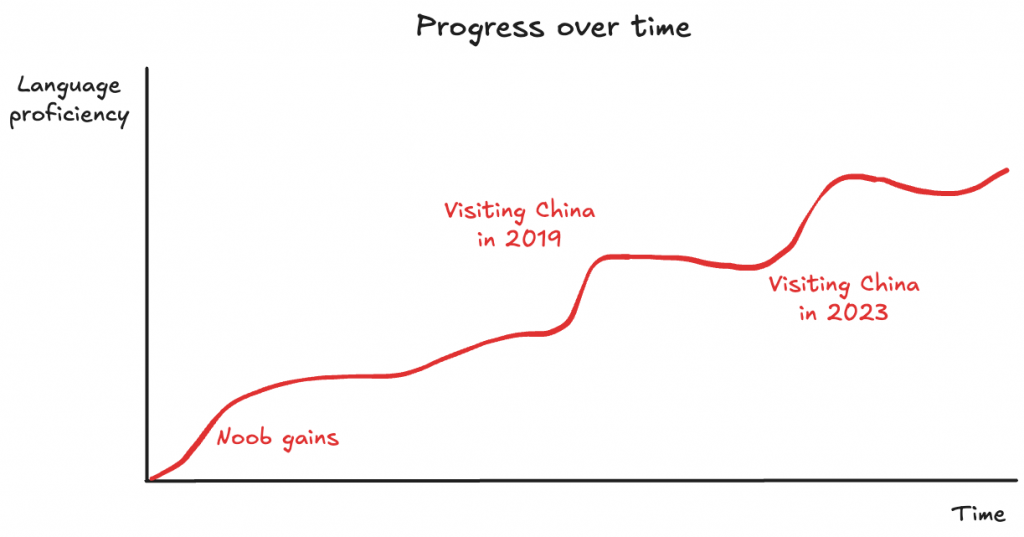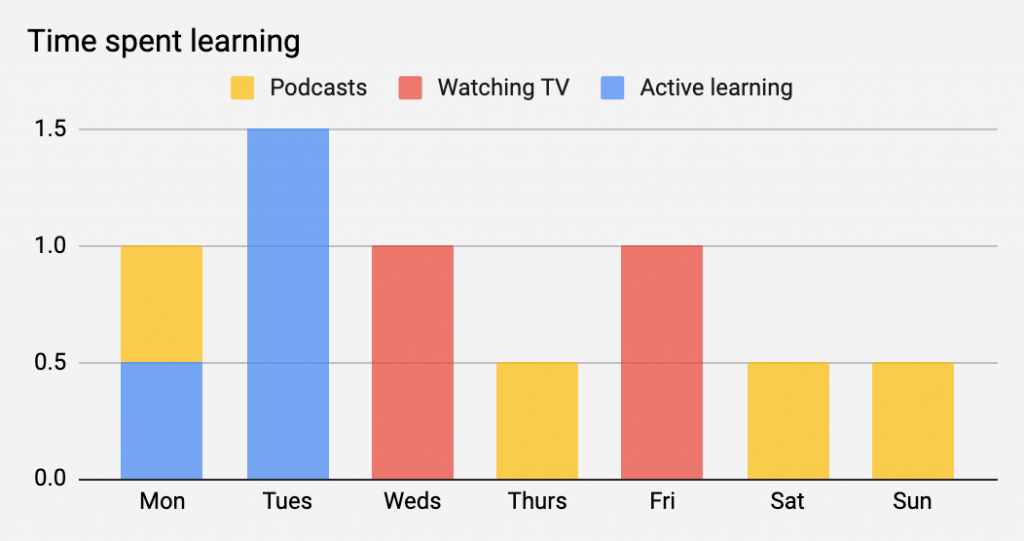
Why language learning is a great hobby to have, how to avoid negative ways of thinking when learning languages, and the strategies which have served me well so far.
⚠️ Disclaimer: I’m by no means an expert in this area, I’m just an enthusiastic language learner. Learning Mandarin has brought me many benefits, and I wanted to share my thoughts on the experience!
Why learn a new language?
- Learning a new language opens up new experiences and new ways of thinking.My partner and I had an unforgettable experience taking my parents and brother on a trip around China. We introduced my family to loads of tasty food, explained the different gestures and customs, and were able to point out that what’s “normal” in China is quite different than what we’re used to. That wouldn’t have been possible if I hadn’t put the time into understanding the language.
- It allows you to connect, on a deeper level, with people from a different culture.
- It helps you to recognise inconsistencies and strange aspects of your native language (in my case, English) which is kind of fun. It’s easier to empathise with people struggling to learn English now that I’ve gone through a similar process!
- It allows you to develop patience and discipline (which you can then apply to plenty of other areas in life!).
- You don’t need to immerse yourself or devote every waking moment to it. It can be a part time project; you can put in as much or as little effort as you’re willing to commit (although, some base level of commitment is necessary to feel like you’re progressing!)
- The process is actually enjoyable
Why learning a new language might not be right for you
Whilst I do think everyone should consider it (if they’re interested), there are some clear obstacles.
- It’s a long-term commitment that needs consistent practice, which could feel overwhelming if your schedule is already packed. It also requires mental energy, especially in the early days when ‘passive learning’ isn’t really an option. After a long day at work you’d be forgiven for wanting to just switch your brain off!
- Language learning involves a lot of frustration. If you’re someone who struggles with failure or doesn’t like being outside your comfort zone, the whole process can be disheartening, and you might quit before you start seeing results.

How not to think about learning a language
- Don’t think of it as having an “end point”. I don’t consider it as something you do once and then stop forever, having successfully “learnt” the language. If you treat learning a language as a lifelong commitment then you won’t put pressure on yourself to rush certain things, you’ll enjoy the process, and you’ll mentally prepare yourself for the challenges ahead. Sure, milestones along the way are still great to keep you motivated. But I find that building solid habits and figuring out the question of why you want to learn the language much more effective than the idea of it being an achievement you can stuff into your back pocket.
- Don’t compare yourself to others. This seems to be the case for everything nowadays, but there’s always going to be someone better than you (duh). It’s much more productive to compare where your language level is now, versus where it was last month or last year.
Every language learner has
– different goals; you could be trying to find a job or just looking to meet new friends
– different starting points; you’d be surprised how many people used to study it in school, or used to live in their target country and are now learning to brush up
– different time commitments. If you browse the AJATT subreddit (All Japanese, All The Time) you’ll find plenty of people who are able to commit every waking hour to their target language. Most people are not able to do that. If you have a job and kids I’m sure you’d be hard pressed to find more than a couple of hours of active learning per week.
Comparing yourself to other people is only going to lead to feelings of frustration. Don’t do it. Just look at where you are now, and how far you’ve come. - Don’t buy into the narrative that adults can’t learn new languages. There are so many adult learners out there. It definitely is easier to learn when you’re a child, and there are plenty of studies backing that up. But in my opinion if adult learners can temper their expectations on how quickly they can learn, and be willing to put in a bit of effort on a consistent basis, then they’ll be just fine.
ChatGPT can translate everything for me already. Why bother?
Well, that’s true. It might be tempting to just use a language model to translate what you want to say and hear, and skip learning the language altogether. This might work fine for short-term situations, like going on holiday or ordering food, but it misses the magic of direct, spontaneous communication. You’re not truly engaging on the same wavelength as the other person if you’re using a tool to translate.
Also, current tools just don’t translate things very well! Cultural nuances can get completely lost in translation; a sentence that’s thoughtful and considerate in one language might come across in rude when you translate it directly. The tools will likely improve at this over time, but I’d argue it’s much safer to just understand those cultural differences in the first place. I also struggle to see how AI would ever be able to reliably translate jokes or puns between languages (without completely butchering it).
Even if AI eventually automates translation and interpreting jobs, if you treat language learning as a hobby that allows you to live a more fulfilling life, I don’t think that’s anything AI can replace. If anything the rise of generative AI means we’re living in a time where there are more tools and resources than ever at our disposal. It’s easier than ever — you just need to be willing to put in the time and effort.
My approach to language learning
Context and journey so far
Firstly, I’ll outline my current situation for better context.
- I’ve learning Mandarin since late 2017, so that’s about 7 years at time of writing
- My partner speaks Mandarin natively (which makes it much easier to learn)
- I live in the UK (which makes it much harder to learn)
To be honest, I feel like I don’t have a lot of time to commit to learning Mandarin. Most of my learning is done passively through podcasts or TV shows, and occasionally I’ll spend a couple of hours studying in a cafe, but it’s rare. The chats I have with my wife about difference between Mandarin and English are invaluable to my learning journey, but I wouldn’t consider it as part of my ‘approach to learning’ – they come in spontaneous and random flashes.
I’ve made steady progress for the last 7 years to the point that I’d consider myself intermediate to upper-intermediate (whatever that means). I do have weeks or months where I barely study at all. I’ve had the opportunity to visit China twice which definitely boosted my level a lot, and gave me something clear to toward towards each time. Here’s a chart.

One pretty painful truth of second languages, is that if you don’t practice consistently, your language level does deteriorate. This can be pretty demotivating if you have been putting in lots of effort, take a couple of months off, and find you are back to square one.
However, once I got past a certain point, I found I could rely heavily on passive learning to maintain my level without a lot of effort. If I don’t actively push myself to learn new vocabulary then I might not improve by much, but at least my understanding of the language doesn’t drop significantly.
What I currently do
I recently started taking weekly lessons which have been amazing, and I wish I’d started that sooner. If you’re based in London or New York, check out Manhattan Mandarin – I can highly recommend it. The weekly lessons means that I commit myself to at least 1.5 hours of active learning during the lesson, and the pressure of turning up to lessons prepared means I also spend a short amount of time between lessons actively studying. This is enough to keep the ball rolling for me.
It’s helpful to think of language learning in terms of the 4 main areas: Listening, Reading, Speaking, and Writing.

I tend to focus on listening and reading more than the others, because I find watching TV or reading way easier. I am not good at handwriting characters, but can happily type sentences on my laptop or phone). I’m also naturally a very quiet person, so I find engaging in group conversations to be difficult (even in English). Speaking and writing are two areas I probably need to invest more time into.
This level of commitment is something which is doable for me, outside of a full-time job and other projects. occasionally I go through bursts of improvement when I’m motivated and when life’s circumstances allow for it. But if I can’t go through a burst, the regular passive learning in the chart above means that I can maintain my current level without too much effort.
Conclusion
I’m not really sure what the point of this post is! I just wanted to put out my thoughts on learning languages as a hobby. I hope I’ve explained why I consider it a worthy way of spending a bit of time each week. And that it’s not as intimidating as some people think. There are some obstacles, especially for adult learners with a busy schedule. But thanks to technology, there are also loads of tools out there to make it a bit easier for you.

